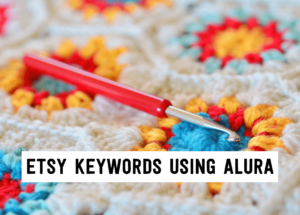
How to find the best Etsy keywords in 3 simple steps using Alura
If you want to be found in search results on Etsy, you need to optimize your product listing for SEO. And if you want to
join
join
If you’ve clicked on this article, you’re probably starting a handmade business and you’re trying to decide if you want to sell on Etsy or have your own website – or possibly both!
And you’re probably finding a million blogs and a million videos out there on YouTube that are telling you
“the X reasons why you should never use Shopify and sell on Etsy instead,” or
“the X reasons why Etsy sucks and you should sell on your own website instead”
. . . and I hate this type of advice, because it’s very black and white. Often it’s serving the interests of the person who’s creating the content because they are selling you a service or program or course that has to do with the platform they are telling you to use.
And so it’s not really serving you in understanding what could be best for your business.
My approach is to show you that there’s no one size fits all, that you can be extremely successful on Etsy and you can also be extremely successful on your own website! It’s more about finding the best fit.
So this week I wrote an article that is going to help you decide what is the best selling venue to use for YOUR business! We’re going to go through 4 selling scenarios, help you find the one that best matches your business and goals, then talk about which selling venue can work best for that specific situation.
So, ready? Let’s dive in.
Before we talk about our 4 scenarios I want to be sure that you understand that you can be successful on whatever platform you choose if that platform is a good match for your business goals.
What I honestly see every day with the makers I work with is that there’s no rule for choosing the “best” selling platform — you can make any of them work — it’s all about finding what’s going to be right for you in your specific situation.
I also want you to know that I won’t be talking about selling platform pros and cons in this article because I already have an Etsy pros and cons article – it takes a close look at all the great things about Etsy AND all the not so great things about Etsy – which is very valuable and helpful information you will want to have before making your decision.
What I want to do in this article is actually run you through the four selling scenarios that you may be evaluating . . .
. . . and tell you for each one why it could be a good fit for your business . . . and why it might not be a good fit!
You can look at each scenario and decide for YOU which selling scenario is going to be the best match and be most successful for your business.
Now on to our selling scenarios! The first one is selling on Etsy only.

free “Beyond etsy” training!
Discover how to make a full-time income and future-proof your business without spending every waking hour on social media, or having to rely on Etsy’s ever-changing platform.
Selling on Etsy only is a great option for you if:
If you are one of those people where building your own website would pretty much prevent you from even starting your business, because that’s just not something that you’re willing to do or learn to do, then Etsy is a good fit for you.
One of the best things about Etsy is that they take care of all of this for you – you can just sit back and focus on your business!
What I mean by that is that you have to make sure that you’re okay with Etsy calling the shots.
If you’re only going to be selling on Etsy, you have to understand that it is their business and they get to do whatever they want. And so you have to accept that the fees might go up sometimes, they might add some elements to the terms and conditions that you might need to adapt to – things like that.
This is not necessarily a problem, it’s just something that you need to be OK with if Etsy is going to be a good fit for you.
If you are OK having all your eggs in one basket, it’s a good idea to compensate for this fact by not having all your marketing eggs in one basket and not just relying on Etsy SEO.
What I mean by this is that you don’t want to only rely on the traffic that they send you from Etsy SEO and Etsy search traffic. You should be willing to drive your own traffic to the platform using social media or Pinterest or other external sources of traffic.
If you’re willing to do that and not just rely on Etsy SEO, then this selling platform could be very successful for you.
If you’re considering selling on Etsy you will definitely want to go and read the pros and cons of Etsy article after you read this one, there are a lot of reasons it can be a great choice.
Now, there are also very important reasons that you may not want to sell on Etsy:
First, you may not want to sell on Etsy exclusively if this Etsy shop would be your main income, or the main source of income for your household.
The reason I say that is because again, Etsy can change things: they can close shops and change rules and fees. And we don’t want you to have to take that risk if it represents 100% of your income, or if you want it to become 100% of your income.
Now some people are less risk averse than others, and if you’re happy with taking that risk, then go for it. But generally speaking, if you want this business of yours to become the main source of income for you, selling exclusively on Etsy might be a little risky because you want to have a bit more control over that income.
You may do some research and find your products are not necessarily a fit for the Etsy platform, or that the Etsy competitors in the niche that you want to sell in are massively underpriced.
An example of your products not being a “fit” would be if you sell very, very high end or very customizable products. These just won’t work on a platform like Etsy – they require your own website to be presented properly to your customers.
If you are selling that type of product, then Etsy is not going to be a good fit for your business, because that’s not what the Etsy customer comes looking for. In that situation I would recommend having your own website
I also want to talk about another situation you might encounter where you find massive underpricing in your niche on Etsy. There are always people underpricing in every niche on Etsy, sadly, but there should also be people who are competing at the right price – at the price that you want to charge so you can actually make a profit.
If you do the research, and you realize that everyone is selling something for $5, and you’re like “I can’t possibly sell this for less than $30,” it’s going to be hard to make Etsy work.
In a case like that it may be worth considering another platform or your own website where your customers won’t be influenced by the other prices that they see. . . because you don’t want to be part of this race to the lowest price!
Moving along, the third reason not to sell on Etsy is if there’s any chance that you might go against Etsy’s terms and conditions.
Obviously, you should always respect the terms and conditions when you sell on Etsy. You want to be 100% Etsy suitable if you’re only going to use Etsy.
I’m not talking about things like copyrights and using Disney characters and stuff like that – because of course that’s not ok and you should never do that.
What I’m talking about is that your products fall within Etsy’s terms and conditions, as in the product/design is handmade by you, and you don’t sell any of the items on their prohibited items list.
If there’s anything that you sell that could conflict with the terms and conditions then definitely consider selling on your own website instead.
Next, you need to look up all the specifics for your country – things like fees, requirements, and payment integrations – and determine if they work for you.
You don’t want to get caught off guard after setting up your Etsy business and find out it doesn’t work for your country or currency or makes shipping or receiving payments difficult!
And then finally, take into consideration if you are selling locally or nationally. If you live in a small country that doesn’t have many people shopping on Etsy, and you’re not interested in selling internationally, then Etsy isn’t a good strategic fit for your business.
Keep in mind that Etsy has a lot of customers everywhere in the world, but there are also some countries where Etsy isn’t big, and people don’t really know Etsy . . . and so they wouldn’t necessarily come to Etsy to shop for your products.
Obviously it’s going to be a lot harder for you to make the most out of Etsy in that case and you might be better off using a local or national marketplace based in your own country or building your own website.
Next let’s talk about selling scenario #2: sell on Etsy first then get your own website.
I see a lot of people that decide to start on Etsy and then further down the track they have a plan to eventually get their own website.
And as with everything, this can be good or bad depending on your reasons for doing it.
It’s good if:
Selling on Etsy first is a good plan if you want a quick way to set up and test out your products and new ideas without necessarily committing straight away to a website, which is a time commitment and a bit of a money investment as well.
Selling on Etsy first can also give you a confidence boost.
It allows you to get set up quickly and see if you even like running a handmade business, see if people are buying your products and experimenting with different products, and essentially kind of dip your toes in to see if it feels good before you commit to a website.
Now there are also reasons people open an Etsy shop first that aren’t good.
The first reason is if you are opening an Etsy shop because you want quick results and you think it will be easy and fast.
I sometimes see makers thinking they’re going to get a quick start on Etsy so they get sales to start coming in, and then they plan to make their own website.
And sure, of course you can get sales fast on Etsy, but that’s not guaranteed.
You still have to do the work, right? You’ll still have to do your Etsy SEO and your marketing. So if you expect Etsy to be easy and fast in order to make sales it may lead to disappointment because you’ll still need to do marketing as much as if you’re working on your own website.
So what you skip by using Etsy is the setup and tech – not the marketing – you still need to get your business off the ground marketing-wise.
I also wouldn’t recommend setting up an Etsy shop if your long term vision is to only sell on your website.
If you’re committed to making your handmade business succeed long term from the start, as in this isn’t an experiment but a long-term career choice and your goal is to sell on your own website, then start there and go straight to what you want in the end. Because if that’s the case then starting on Etsy first is essentially just a chunk of time and effort you’re going to spend getting it up and working instead of putting that time and effort into your long term goal of a website.
I’m saying this because I want to make sure you don’t feel like you have to start on Etsy first, you definitely can skip Etsy and instead get working on your own website straight away!
Next let’s talk about our third scenario, you want to sell on Etsy AND have your own website right from the start.
This is a good strategy if:
So essentially, if your main goal is to grow your website – and your sales and revenue on your website – but you’re happy to maintain an Etsy store on the side, then this is a good plan.
What works really well in this case is that you will have your products on Etsy but you won’t drive your own traffic to Etsy. You’re not going to use social media, Pinterest, and all this stuff to drive people to Etsy, you’re just going to let Etsy SEO bring your Etsy customers to your shop.
It’s almost like Etsy becomes a marketing source to help you get customers that might be on Etsy to buy from you. And then once they know that you exist, they might start going to your website after that.
So you will let Etsy SEO find Etsy customers, and you will focus your marketing time and efforts on social media and Pinterest and all of that, to send traffic to your own website instead.
Selling on Etsy and your own website is not a good plan, though, if
Let’s face it, it will take a fair amount of your time to run those two platforms from the start, especially if you have limited experience. And I just want to be honest, you don’t want to undertake both at once if you don’t have the time to do it because it can be a LOT of work!
It’s also not a good idea if you plan to do what I call double marketing. What I mean by this is if you want to use social media for your Etsy shop and also send people from social media to your website as well.
Not only is this a lot of work but it can often be counterproductive. It’s better to do what I was saying before, which is if you’re going to start with both at the same time, put all your effort to grow in your website, because you own it.
And then just use Etsy SEO for Etsy marketing and consider Etsy as a little add-on essentially to your website.
And now on to our final selling scenario, selling on your own website only!
This is a good option if:
If having your own website is your long term goal – you know this is what you want – then by all means this is a good option for you and you should dive in!
There’s no reason for you to do a detour via Etsy, just work on your website straight away. You will have to bring in your own traffic, either organically or with paid ads, so you need to be willing to put your time and effort into creating your site and into marketing it to find that traffic.
This is related to what I was saying above about product fit. Sometimes your product is not going to be a fit for Etsy: maybe you are selling super high end luxury products that won’t stand out in the price-competitive Etsy marketplace or that needs to be presented visually in a certain way that only a custom layout will allow for.
As I said above, if you sell on Etsy you need to be OK with Etsy making the rules and calling the shots.
If you prefer to have control and you don’t want to be constrained by Etsy’s rules, having your own website will be a much better fit for you and your business.
That said, there are also reasons you should pause and reconsider having your own website:
First – and most obvious – is if you are tech-averse.
Setting up and running your own website requires you to step into the technical side of things time and again. If you don’t like figuring things out, like payment systems or page layouts, having a website may not be for you.
Setting up a successful website takes time and money. If you aren’t sure you are in this for the long haul, you may want to consider setting up a shop on Etsy first as a trial to see if you enjoy being a handmade seller and if your products are successful – like we talked about in scenario 2.
Remember, it will take time for your marketing to be effective and drive traffic to your website, so you have to be willing to 1) put the work in to create the website and 2) put in the marketing effort long enough for it to pay off and start generating traffic and customers.
If you aren’t ready to invest that time then a website may not be the right choice for you right now.
If so, the next article you will want to read to help you with this decision is all about the pros and cons of selling on Etsy.
Give it a read and you can learn even more about Etsy and if it’s the right selling platform for your wonderful handmade business!
Thanks for reading, and until next time, aurevoir!

watch this free 15-min training
and learn how to scale your website sales (without working around the clock or spending 24/7 marketing on social media)
you might also like…
related articles

If you want to be found in search results on Etsy, you need to optimize your product listing for SEO. And if you want to
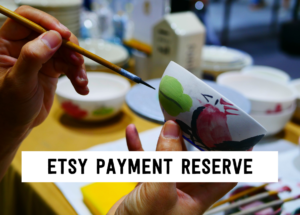
There has been a lot of talk in the Etsy community — and I mean A LOT of talk — about Etsy’s payment account reserve
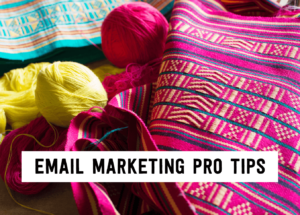
Anyone who knows me knows that I am a HUGE advocate for using email marketing to grow and scale your handmade business. But you may
disclaimer
subscribe to youtube
THE LAUNCHPAD
get in touch
We acknowledge and give thanks to the Budawang and Yuin people, the Traditional Owners of the land we work and live on. We pay our respects to all Aboriginal and Torres Strait Islander Peoples and elders past, present and emerging.
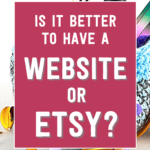
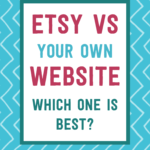

learn how to grow your online store sales into a consistent and predictable income

Learn how to grow your business beyond etsy as easily as possible

learn how to scale your website sales (without working 24/7)